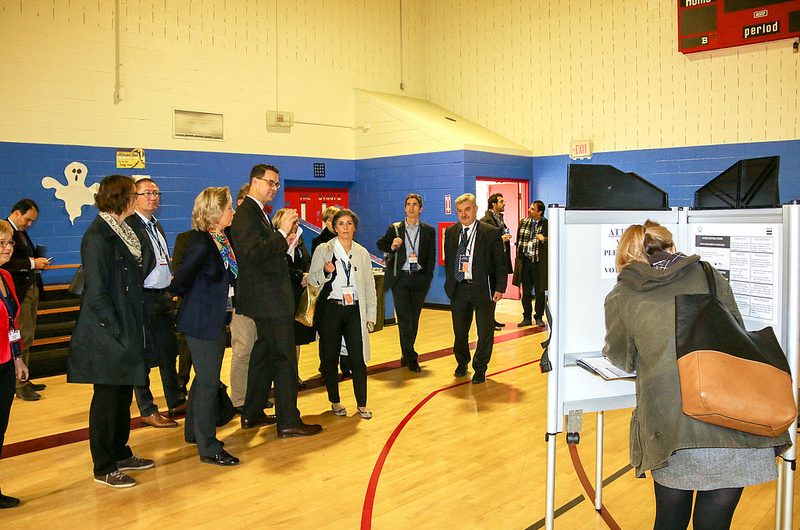Trump needn’t worry about ‘rigged’ poll. OSCE is an observer & Putin rather likes them

OSCE observers at a polling station in Washington, DC
Donald Trump has said he worries the November 8 election will be “rigged” against him but surely he must take some comfort from the fact that America’s trysts with the ballot box are routinely observed by the OSCE? That the organization, which has traditionally focused on monitoring elections in emerging democracies, has formally done so for the US as well since 2004? That it was invited to do so by President George W Bush’s administration after 13 thirteen senators of the Democratic Party petitioned for this.
And surely Mr Trump, who has a good opinion of – but absolutely no relationship with – Vladimir Putin, will be reassured that the Russian president rather likes the OSCE at least when it doesn’t interfere with his plans for Ukraine?
It will take too long to sketch a full picture of Mr Putin’s shifting regard for the 57-member Organization for Security and Co-operation in Europe. Suffice it to say he has occasionally been suspicious that it is a tool of the West but after it’s halting approach to the Minsk Protocol and the war in Donbass, Mr Putin has been reassured he has little to fear from the OSCE.
Anyway, the point about Mr Putin’s relative regard for the OSCE (relative to his opinion of Nato and the European Union, that is) is that Donald Trump should be pleased that Russia is fine with it. And that the OSCE has November 8, the date of the US presidential election, clearly marked on its diary. (Click here to be reassured on that point, as I’m sure Mr Trump must be.)
In 2012, the OSCE did its usual rather professional job of election monitoring. It despatched a so-called “Limited Election Observation Mission (LEOM)” to the US on October 3 to observe the November 6 general elections. In its final report, it said that the task was to assess “compliance of the electoral process against OSCE commitments and other international standards for democratic elections, as well as with domestic legislation.”
It declared itself satisfied on that point, saying the elections “took place in a competitive environment and were administered in a professional manner.” It commended the “vibrant” campaigns, the full media coverage and the “broad public confidence”.
However, it did bemoan the over-politicisation of “decisions on technical aspects of the electoral process” and suggest “further steps …to improve the electoral process, in areas such as voting rights, the accuracy of voter lists, campaign finance transparency, recount procedures, and access of international election observers.” (Click here to read that OSCE report.)
This last point may be seized on by Mr Trump’s supporters, who may believe their candidate’s declaration that Hillary Clinton is the very “devil” and likely, therefore, to be able to do the most devilish things.
Such as rigging the election. It is an unusual charge for an advanced democracy where general election rules are set forth in state and federal law, overseen by the courts and governed by provisions enshrined in the Constitution. The US, which suffered one delayed election result – the 2000 Bush vs Gore race – is generally seen to have a fair system, with several domestic safeguards including many domestic observers and watchful party officials supervising the process.
This is why American presidential candidates traditionally don’t call into question the whole process.
Even after the contentious 2000 election, Mr Gore did not suggest that Mr Bush was an illegitimate president. At the time, he invoked Senator Stephen Douglas on being defeated by Abraham Lincoln” “Partisan feeling must yield to patriotism” and added, “This is America, and we put country before party. We will stand together behind our new president.”

